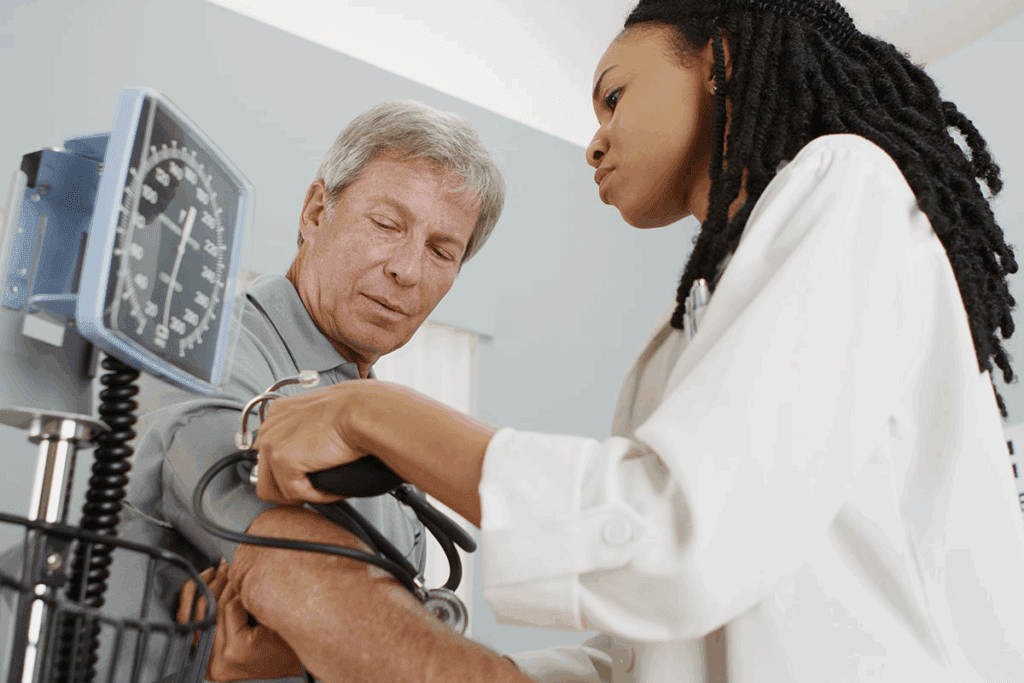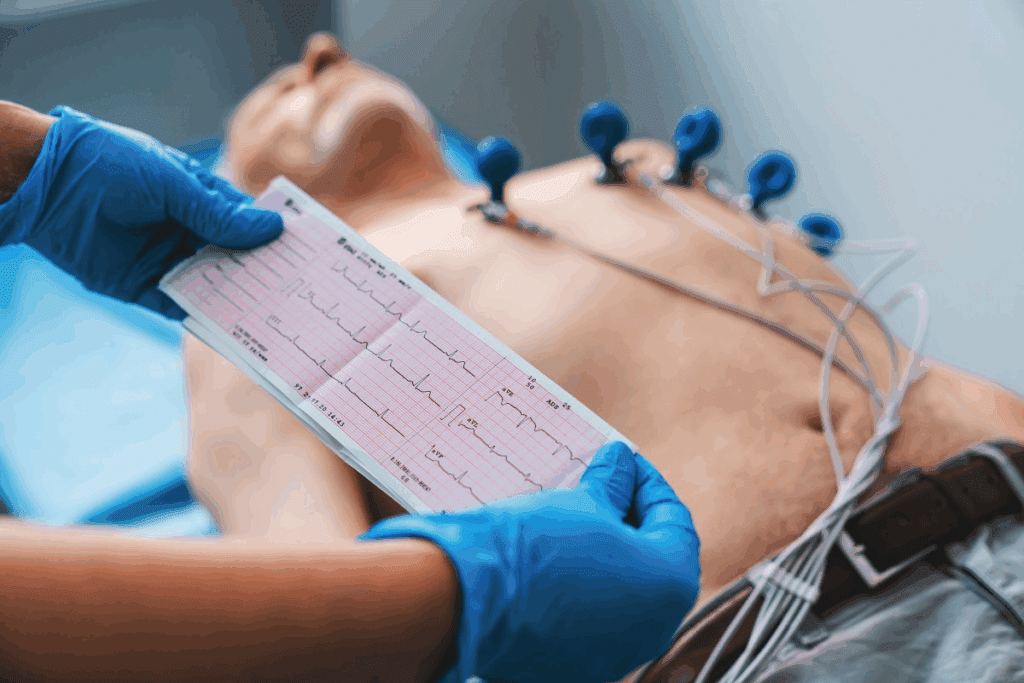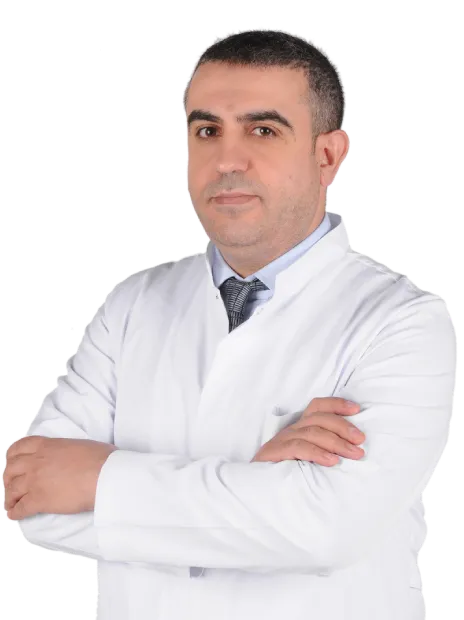
An enlarged heart, or cardiomegaly, is when the heart gets bigger than it should. This can happen for many reasons, like heart problems or other health issues. At Liv Hospital, we know how important it is to spot the key indicators early. This helps us give the best care fast.
Signs of an enlarged heart include trouble breathing, swelling in the legs or belly, feeling very tired, and an irregular heartbeat. You might also feel chest pain or get dizzy. Knowing these symptoms is key to catching the problem early and treating it right signs and symptoms of enlarged heart.
Key Takeaways
- Cardiomegaly, or an enlarged heart, is a condition that can result from underlying cardiac or systemic conditions.
- Common symptoms include shortness of breath, swelling, fatigue, irregular heartbeat, chest pain, and dizziness.
- Early diagnosis and treatment are critical for managing cardiomegaly effectively.
- Liv Hospital offers complete care for patients with cardiomegaly and other heart issues.
- Understanding the causes, symptoms, and treatment options is essential for effective management.
What Is Cardiomegaly? Understanding Enlarged Heart

Cardiomegaly, or heart enlargement, is not a disease itself but a sign of a problem. It means the heart muscle is under strain. Doctors can spot it through medical images.
Definition and Medical Terminology
Cardiomegaly is when the heart gets too big. It happens when the heart has to work too hard. This can make the heart muscle thicken or grow bigger.
The term “cardiomegaly” comes from Greek words. “Cardia” means heart, and “megaly” means big. It’s the formal term for an enlarged heart.
Common Causes of Heart Enlargement
Many things can cause cardiomegaly. High blood pressure is a big one. It makes the heart work harder, causing it to thicken.
Other causes include:
- Heart valve diseases, such as mitral regurgitation or aortic stenosis
- Cardiomyopathy, a disease of the heart muscle
- Pulmonary hypertension, high blood pressure in the lungs
- Coronary artery disease, which can lead to heart attacks and subsequent heart enlargement
| Cause | Description | Effect on the Heart |
| High Blood Pressure | Increased pressure against which the heart must pump blood | Thickening of the heart muscle (hypertrophy) |
| Heart Valve Disease | Diseases affecting the heart valves, such as mitral regurgitation | Volume overload leading to enlargement |
| Cardiomyopathy | Disease of the heart muscle | Direct damage to heart muscle cells |
Types of Cardiomegaly
Cardiomegaly can be divided into two main types. These are hypertrophic and dilated cardiomegaly.
Hypertrophic Cardiomegaly: This is when the heart muscle gets thicker. It usually happens because of high blood pressure or other heart issues.
Dilated Cardiomegaly: Here, the heart chambers get bigger. This makes it harder for the heart to pump blood. It can be caused by many things, like coronary artery disease or cardiomyopathy.
“Understanding the specific type of cardiomegaly is key to finding the right treatment and managing it well.”
Shortness of Breath: The Most Common Symptom

Shortness of breath, or dyspnea, is a key symptom of cardiomegaly. Many people feel breathless, often when lying down or doing physical activities. This is a common sign of an enlarged heart.
Breathlessness During Physical Activity
Feeling out of breath during exercise is an early sign of cardiomegaly. The enlarged heart has trouble pumping blood well. This leads to fluid buildup in the lungs.
- Increased fatigue: The heart working harder can make you feel more tired during everyday tasks.
- Reduced exercise tolerance: You might find you can’t do things as well as you used to.
Orthopnea: Difficulty Breathing When Lying Down
Orthopnea is when it’s hard to breathe when lying down. This is a sign of heart failure, often linked to cardiomegaly.
Symptoms can be alleviated by using pillows to prop yourself up or sleeping upright.
Paroxysmal Nocturnal Dyspnea
Paroxysmal nocturnal dyspnea (PND) makes people wake up at night feeling short of breath. It’s a serious symptom that needs medical help.
It’s important to know these symptoms to catch cardiomegaly early. If you’re experiencing any, see a doctor right away.
Swelling in Legs, Ankles, and Abdomen
Cardiomegaly can cause swelling in the legs and abdomen due to fluid buildup. This swelling, or edema, happens when the heart can’t pump blood well. Fluid then gathers in body tissues.
Why Fluid Retention Occurs
Fluid retention is a common issue with cardiomegaly. An enlarged heart can’t pump blood well. This leads to fluid buildup in the body, mainly in the legs, ankles, and abdomen. Gravity also plays a role, making fluid settle in the lower parts of the body.
The amount of fluid retention can vary. It depends on the heart’s size, how well it works, and other health conditions.
Progressive Nature of Edema
Edema from cardiomegaly often gets worse over time. As the heart’s pumping gets worse, more fluid builds up. This can make everyday tasks harder.
Morning vs. Evening Swelling Patterns
When swelling happens can give clues about its cause. Some people notice more swelling in the evening due to gravity and daily activities. Others might see more swelling in the morning, possibly because of fluid changes during sleep.
| Swelling Pattern | Possible Causes | Characteristics |
| Evening Swelling | Gravity, daily activity | Increased swelling in legs and ankles after a day of activity |
| Morning Swelling | Fluid redistribution, sleep position | Noticeable swelling upon waking, potentially reducing throughout the day |
Knowing when and why swelling happens can help manage cardiomegaly. Recognizing fluid retention signs and how it changes can lead to better heart health. This can help patients get the right treatment sooner.
Persistent Fatigue and Weakness
An enlarged heart can make you feel extremely tired and weak. This makes everyday life very hard. Simple tasks become big challenges.
People with a big heart often can’t do things they used to love. They feel a deep weakness that stops them from enjoying activities.
Reduced Exercise Tolerance
Cardiomegaly makes it hard to exercise. Even simple activities like walking or climbing stairs are tough. The heart can’t pump blood well, so muscles don’t get enough oxygen.
Simple tasks become huge challenges. This not only limits physical activity but also hurts mental health. People feel frustrated and unmotivated.
Fatigue Unrelieved by Rest
Cardiomegaly also causes fatigue that doesn’t go away with rest. Unlike normal tiredness, this fatigue stays even after sleeping well.
This constant fatigue is very debilitating. It affects not just physical but also mental and emotional health. It’s like feeling drained all the time.
Impact on Daily Activities
Reduced exercise tolerance and unrelieved fatigue affect daily life a lot. Even simple tasks like cleaning or going out become too much.
This impact is not just physical. It also affects emotions and social life. People may feel lonely or depressed because they can’t do things they love. They need support and care.
Irregular Heartbeat and Palpitations
People with cardiomegaly often feel their heart beating irregularly or palpitating. This can be scary and disrupt their daily lives. These symptoms happen because cardiomegaly affects the heart’s structure and function.
Sensation of Skipped or Racing Heartbeats
Many with cardiomegaly say their heart skips beats or races. This can be because of premature ventricular contractions (PVCs) or atrial fibrillation. We’ll look into how these irregularities affect patients and how they can manage their condition.
People often feel a “flip” or “flutter” in their chest. This can be very alarming. It’s important for those experiencing these symptoms to see their doctor to find out why.
Arrhythmias Associated with Cardiomegaly
Cardiomegaly can lead to different arrhythmias, like atrial fibrillation and ventricular tachycardia. These arrhythmias happen because the enlarged heart’s chambers can cause abnormal electrical activity.
We’ll talk about the different arrhythmias and what they mean for people with cardiomegaly. Knowing about these arrhythmias is key to managing the condition well.
Monitoring Heart Rhythm Changes
It’s important for people with cardiomegaly to keep an eye on their heart rhythm. Regular doctor visits and using devices like Holter monitors can help track changes.
Spotting arrhythmias or other heart rhythm issues early can help prevent serious problems. We stress the need to follow the monitoring schedule set by doctors.
Signs and Symptoms of Enlarged Heart: What It Actually Feels Like
People with an enlarged heart often feel a range of physical sensations. These feelings can differ from person to person. It’s important to know the common signs of an enlarged heart.
Patient Descriptions of Physical Sensations
Those with an enlarged heart often feel breathlessness when they’re active or lying down. This is called orthopnea and can really affect daily life.
They might also feel their heart pounding or fluttering, which can be scary. Some people feel fatigue and weakness even after resting.
- Shortness of breath during exertion or when lying flat
- Sensation of irregular or forceful heartbeats
- Persistent tiredness and lack of energy
- Swelling in the legs, ankles, or abdomen due to fluid retention
Distinguishing Heart Enlargement from Other Conditions
It’s hard to tell if someone has an enlarged heart just by their symptoms. Symptoms like breathlessness and fatigue can also mean other heart problems.
Doctors use physical exams, medical history, and tests like echocardiograms and chest X-rays to diagnose an enlarged heart.
Variations in Symptom Experience
How someone with an enlarged heart feels can be very different. Some people might not show any symptoms for a long time. Others might have symptoms that really affect their life.
Things like the cause of the enlarged heart, how big the heart is, and other health issues can affect symptoms.
- The underlying cause of cardiomegaly
- The degree of heart enlargement
- Presence of comorbid health conditions
Chest Pain and Pressure
Chest pain linked to an enlarged heart can feel different. It’s important to know what to look for. We’ll help you understand when chest pain is a sign of trouble.
Types and Locations of Discomfort
Chest pain from an enlarged heart can feel like pressure or tightness. It might also feel heavy. The pain can be in the center of your chest or spread to your arms, back, or jaw.
The pain might stay the same or change. It can be mild or very strong. Knowing these details helps doctors figure out what’s wrong.
Differentiating from Other Causes of Chest Pain
It’s key to tell if chest pain is from an enlarged heart or something else. Other issues like heart disease or lung problems can also cause pain. A doctor needs to check to find out why.
Doctors use tests like heart scans and blood work to find the cause. This helps them know what to do next.
| Cause of Chest Pain | Characteristics | Diagnostic Tests |
| Cardiomegaly | Variable intensity, often related to exertion or stress | Echocardiogram, Chest X-ray |
| Coronary Artery Disease | Typically triggered by exertion, relieved by rest | Stress Test, Coronary Angiography |
| Pulmonary Embolism | Sudden onset, often accompanied by shortness of breath | CT Pulmonary Angiography, D-dimer test |
When Chest Pain Requires Emergency Care
Some chest pain needs immediate help. If your pain is sudden, severe, or doesn’t go away, call for help. Also, if you’re having trouble breathing, feeling dizzy, or nauseous, get to the hospital fast.
Quick action can save lives in serious cases.
Key Indicators for Emergency Care:
- Sudden onset of severe chest pain
- Chest pain accompanied by shortness of breath or dizziness
- Pain radiating to the arm, neck, or jaw
- Chest pain that persists or worsens over time
Dizziness, Lightheadedness, and Fainting
An enlarged heart can disrupt normal blood flow, leading to dizziness and fainting. When the heart is enlarged, it can’t pump blood well. This affects the body, including the brain.
Reduced Cardiac Output to the Brain
The brain needs a steady supply of oxygenated blood to work right. If the heart can’t pump enough, the brain might not get enough oxygen. This can cause dizziness and lightheadedness. In bad cases, it can lead to fainting or syncope.
Reduced cardiac output to the brain is a big worry for those with cardiomegaly. It’s not just a small problem. It’s a sign of a serious heart function issue.
Situational Triggers for Symptoms
Certain situations can make dizziness and lightheadedness worse in people with cardiomegaly. These include:
- Standing up quickly from a sitting or lying position
- Exerting oneself physically
- Being in a hot environment
- Experiencing stress or anxiety
Knowing these triggers can help people avoid making their symptoms worse.
Preventing Falls and Injuries
Because of the risk of fainting, it’s important to prevent falls and injuries. Simple steps can help:
- Moving slowly when changing positions
- Using handrails when climbing stairs
- Avoiding standing for long periods
- Having someone nearby when feeling dizzy
By understanding why dizziness and fainting happen in cardiomegaly and taking steps to prevent them, people can lower their risk of falls and injuries.
Subtle Signs of Mildly Enlarged Heart
It’s hard to spot a mildly enlarged heart because the symptoms are mild and slow to show. Spotting these signs early is key for quick diagnosis and treatment.
Early Warning Indicators
The first signs of a mildly enlarged heart can be small and not clear. They might include feeling a bit tired or having heart beats that feel off. Watching these signs closely can help catch heart problems early.
Some people might find they can’t exercise as long or get winded quicker. These small changes can be easy to overlook, but they’re important.
Gradual Changes in Physical Capacity
A slow drop in how well you can do physical things might mean your heart is enlarged. This could be feeling tired more easily or needing to rest more often. It’s important to see these as signs of heart health.
For example, climbing stairs or walking short distances might start to feel harder. Paying attention to these changes can help catch problems early.
Symptoms That Are Often Dismissed
Some signs of a mildly enlarged heart are often seen as minor or caused by something else. For instance, feeling dizzy or lightheaded might seem like just being tired or dehydrated. But these can be signs of heart issues and shouldn’t be ignored.
It’s vital to listen to our bodies and remember any symptoms that keep coming back. Getting a doctor’s check-up when these signs appear can lead to quick diagnosis and treatment.
Knowing the small signs of a mildly enlarged heart and what they mean can help us keep our hearts healthy. Catching it early and treating it right can make a big difference for people with cardiomegaly.
How to Know If You Have an Enlarged Heart: Diagnostic Methods
Diagnosing an enlarged heart involves several steps. These include a physical check-up, imaging tests, and other procedures. Knowing these steps is key to figuring out if your heart is enlarged.
Physical Examination Findings
A physical check-up is often the first step. A healthcare provider looks for signs like:
- Jugular venous distension, which means fluid buildup
- Abnormal heart sounds or murmurs
- Swelling in the legs, ankles, or abdomen from fluid retention
These signs can point to an enlarged heart. They help guide further tests.
Imaging Tests for Cardiomegaly
Imaging tests are vital for confirming an enlarged heart. Common tests include:
- Chest X-ray: To check the heart’s size and shape
- Echocardiogram: An ultrasound that shows the heart’s structure and function
- Cardiac MRI or CT scan: For detailed images of the heart and blood vessels
Additional Diagnostic Procedures
Other tests may be needed to check the heart’s function and find the cause of an enlarged heart. These include:
- Electrocardiogram (ECG): To check the heart’s electrical activity
- Blood tests: To look for signs of heart failure or other conditions
- Stress test: To see how the heart works under stress
When to Seek Medical Evaluation
If you have symptoms like shortness of breath, chest pain, or swelling, see a doctor. Early treatment can greatly improve your health and life quality.
If you’re worried about your heart or have been told you have an enlarged heart, talk to a healthcare professional. They can offer personalized advice and support.
Conclusion: Managing and Monitoring Heart Health
Knowing the signs of an enlarged heart is key to early treatment. We’ve looked at symptoms like shortness of breath and swelling in legs. Also, irregular heartbeat is a sign to watch out for.
For those with cardiomegaly, managing heart health is essential. Regular check-ups and tests help prevent serious issues. At Liv Hospital, we offer top-notch care for international patients, ensuring they get the right treatment.
Being aware of heart symptoms helps people get help fast. Our team is here to provide personalized care. We help patients live active, happy lives.
Managing heart health is a team effort. Patients, doctors, and caregivers all play a part. We urge everyone to stay on top of their heart health and seek medical help when needed.
FAQ
What does an enlarged heart feel like?
An enlarged heart can cause symptoms like shortness of breath and fatigue. You might also notice swelling in your legs and ankles. Some people feel a heavy or pounding sensation in their chest.
How do I know if I have an enlarged heart?
To find out if you have an enlarged heart, you need a medical check-up. This might include a physical exam, imaging tests like an echocardiogram, and other tests.
What are the warning signs of an enlarged heart?
Warning signs include shortness of breath, fatigue, and swelling. You might also feel irregular heartbeats or chest pain. If you notice these, see a doctor right away.
What is cardiomegaly?
Cardiomegaly is when your heart gets too big. It happens due to high blood pressure, heart valve disease, or cardiomyopathy. It makes the heart muscle thick or the chambers big.
What are the symptoms of cardiomegaly in adults?
Adults with cardiomegaly might feel short of breath or tired. They could also have swelling, irregular heartbeats, or chest pain. Some people might not notice any symptoms at all.
How is cardiomegaly diagnosed?
Doctors use a physical exam, medical history, and tests like echocardiograms and chest X-rays to diagnose cardiomegaly. They also use electrocardiograms.
Can a mildly enlarged heart cause symptoms?
Yes, even a slightly enlarged heart can cause symptoms. These might be mild, like feeling tired or short of breath. It’s important to watch for these signs.
What is the difference between hypertrophic and dilated cardiomegaly?
Hypertrophic cardiomegaly means the heart muscle is thick. Dilated cardiomegaly means the heart chambers are big. Both can cause symptoms and need medical help.
How can I prevent falls and injuries if I have an enlarged heart?
To avoid falls and injuries, be careful of things that make you dizzy. Stand up slowly and try to stay balanced. Improving your mobility can also help.
When should I seek medical attention for chest pain?
If you have severe or ongoing chest pain, get help right away. This is true if you also feel short of breath, dizzy, or faint.
References:
- Martinez-Lemus, L. A. (2012). The dynamic structure of arterioles. Basic & Clinical Pharmacology & Toxicology, 110(1), 5-11. https://pubmed.ncbi.nlm.nih.gov/21989114/


































